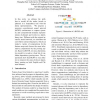Free Online Productivity Tools
i2Speak
i2Symbol
i2OCR
iTex2Img
iWeb2Print
iWeb2Shot
i2Type
iPdf2Split
iPdf2Merge
i2Bopomofo
i2Arabic
i2Style
i2Image
i2PDF
iLatex2Rtf
Sci2ools
ACL
2015
2015
A Re-ranking Model for Dependency Parser with Recursive Convolutional Neural Network
In this work, we address the problem to model all the nodes (words or phrases) in a dependency tree with the dense representations. We propose a recursive convolutional neural network (RCNN) architecture to capture syntactic and compositional-semantic representations of phrases and words in a dependency tree. Different with the original recursive neural network, we introduce the convolution and pooling layers, which can model a variety of compositions by the feature maps and choose the most informative compositions by the pooling layers. Based on RCNN, we use a discriminative model to re-rank a k-best list of candidate dependency parsing trees. The experiments show that RCNN is very effective to improve the state-of-the-art dependency parsing on both English and Chinese datasets.
| Added | 13 Apr 2016 |
| Updated | 13 Apr 2016 |
| Type | Journal |
| Year | 2015 |
| Where | ACL |
| Authors | Chenxi Zhu, Xipeng Qiu, Xinchi Chen, Xuanjing Huang |
Comments (0)

